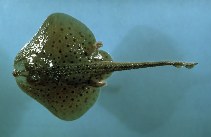| Family: |
Rajidae (Skates) |
| Max. size: |
62 cm TL (male/unsexed); max. reported age: 12 years |
| Environment: |
demersal; marine; depth range 10 - 914 m, oceanodromous |
| Distribution: |
Western Atlantic: southern Gulf of St. Lawrence and Nova Scotia in Canada to North Carolina, USA. |
| Diagnosis: |
|
| Biology: |
Usually on sandy or gravelly bottoms from shoal waters to 90 m depth (Ref. 7251), with temperature range of 1.2-21°C. Benthic (Ref. 5951). Mostly inactive during daylight, but active under dark conditions (Ref. 10807). Feeds on bottom-dwelling organisms such as crabs, shrimps, polychaetes, sea squirts, mollusks, squids and bony fishes (Ref. 27549). Oviparous. Distinct pairing with embrace. Young may tend to follow large objects, such as their mother (Ref. 205). Eggs are oblong capsules with stiff pointed horns at the corners deposited in sandy or muddy flats (Ref. 205). Egg capsules are 4.6-6.3 cm long and 2.7-4.8 cm wide, about 10-35 eggs are laid annually (Ref. 41250). Possesses an electric organ located in the tail region (Ref. 10807). Electric organ discharge (EOD) activity is intermittent (Ref. 10011) and seemed more frequent during dark periods (Ref. 10808). The individual EOD of this species is monophasic, head-negative, and lasts 70 ms (Ref. 10011). |
| IUCN Red List Status: |
Least Concern (LC); Date assessed: 19 July 2019 Ref. (130435)
|
| Threat to humans: |
harmless |
Source and more info: www.fishbase.org. For personal, classroom, and other internal use only. Not for publication.
